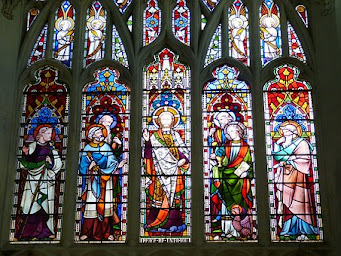The role of women in the apostolic circles during the early Christian period is a topic of ongoing debate among scholars. Some argue that women were active as missionaries and co-workers alongside men, while others claim that their participation was limited. In this essay, I will explore the evidence for the involvement of women in the apostolic circles as both missionaries and co-workers, and consider the implications of this evidence for our understanding of the role of women in early Christianity.
One of the most prominent examples of a
woman in the apostolic circles is Phoebe, who is described in the Bible as a
"deacon" or "servant" of the church in Cenchreae (a port
city of Corinth, Greece). According to the Apostle Paul's letter to the Romans,
Phoebe was a benefactor of many people, including Paul himself. In his letter,
Paul asks the Romans to "welcome" and "assist" Phoebe in
whatever she may need, indicating that she was likely a respected and valuable
member of the community. This passage suggests that Phoebe had a significant
role within the Christian community, possibly as a leader or teacher.
Another example of a woman in the
apostolic circles is Prisca (also known as Priscilla), who is mentioned several
times in the Bible alongside her husband Aquila. According to the Bible, Prisca
and Aquila were tent-makers who hosted Paul in their home, and they were also
involved in teaching and spreading the Christian faith. In the book of Acts, it
is stated that "Prisca and Aquila, together with the church that meets in
their house, send you hearty greetings in the Lord." This passage
indicates that Prisca and Aquila were not only hosts to the Apostle Paul, but
also had a significant role in leading and nurturing the Christian community
that met in their home.
Additionally, several women are mentioned
in the Bible as being "co-workers" of Paul. For example, in the book
of Romans, Paul greets "Mary, who has worked very hard among you."
This statement suggests that Mary was involved in the same kind of missionary
work as Paul. Similarly, in the book of Philippians, Paul greets "Euodia
and Syntyche, my fellow workers in the Lord." This passage indicates that
Euodia and Syntyche were involved in the same kind of work as Paul, indicating
they were likely active in mission and spreading the Christian message.
Aside from the biblical accounts, there is
also evidence from early Christian literature and artifacts, such as
inscriptions and sarcophagi, that suggest that women played a significant role
in early Christianity as leaders and teachers. For example, inscriptions found
in the catacombs of Rome indicate that women were members of the Christian
community and were involved in the administration of the church. Similarly,
early Christian sarcophagi depict women in positions of authority and
leadership, such as holding a book or a scroll, which are symbols of teaching
and learning.
In conclusion, the evidence suggests that
women played an active role in the apostolic circles as both missionaries and
co-workers. They were respected members of the community, who played
significant roles as leaders and teachers in the early Christian church. This
evidence challenges the traditional view that women were largely excluded from
leadership roles in early Christianity, and rather they were active and
respected figures within the early Christian community.
It’s worth to mention that Christianity
itself in the 1st century was still a developing religion and that different
Christian communities had different attitudes towards the role of women, also
in some instances as the role of Phoebe, the term “deacon” or “servant” could
be translated as a broader or more general term, indicating a role that may not
have been limited to administrative or support functions, but rather, included
active participation in spreading the faith and teachings of the Christian
community.








0 Comments